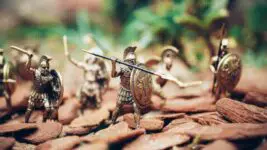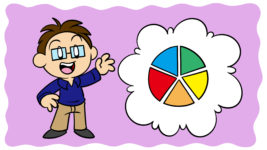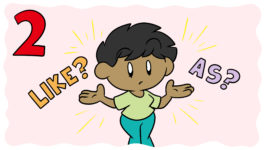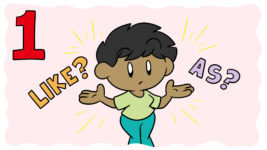Like it or not, names have a huge influence over how we perceive their bearers. The right name can establish a character’s aims or personality before they’ve spoken a single word.
What’s in a name? That which we call a rose
By any other name would smell as sweet.
– William ShakespeareNot if you called ‘em stench blossoms.
– Bart Simpson
Every author dreams of ‘retiring’ a character name, writing a James Bond or Sherlock Holmes who claims the moniker absolutely and forever. Of course, part of this is how you write the character but choosing the right name, the one that resonates with that almost indescribable truth of who they are, is half the battle.
Naming characters is a coveted skill, one that some have in abundance and others spend hours sweating over. Whether you’re in the former group or the latter, here are some tips that will help you find the perfect character name.
What’s in a name?
In his fascinating book Alphabetical Michael Rosen meditates at length on the origin of his own name.
In the early years of the nineteenth century, Jews sought equal rights in the German principalities. Part of the deal was that they would take on German names in their daily affairs… Jews had to buy these new names… in my family name, though, there is the memory that some forebear had enough money to buy an old German name which was used to record that someone worked in the rose-water trade.
What’s more, it has been suggested that the Rosen-type names were popular amongst those Jews whose Hebrew name recorded a matronymic, a name that says: ‘I am the son of this woman’. So, a man might be Ezra Ben Rosa – son of Rosa, and to remember that, some people opted for one of the Rosen-type names.
Here he relates how names can be at once the results of oppression, an indicator of social status (either historical or current), a cultural touch-stone and a mark of love or respect.
Providing a character with this kind of context makes a bold and complex statement about who they are, even to readers who don’t know the exact history and details behind a name. We all know people who suit their names but how we can we make that judgement without understanding that some names suggest certain characteristics? We understand the cultural traditions around a name even if we don’t know where all those traditions began.
Names can be a simple label to identify one character from another, but with so much information readily available why not put that extra bit of effort into names that really mean something?
Characters’ relationships with their names
Names define personality and individuality. In The Trial Kafka names his protagonist Josef K to limit his power and highlight the dehumanizing formality of the setting.
Of course names don’t exist in a vacuum, and the significance of a name can also stem from how others use it.
In Charles Dickens’ Great Expectations the protagonist’s inability to pronounce his own name indicates his inability to control his own life. Reducing him from Philip Pirrip to Pip identifies his child self as a separate identity. Later this nickname is used to draw him back to the relationships and powerlessness of his youth. His inability to use his family name also relates his status as an orphan.
Where to find names
There are lots of places you can look to source character names:
- TV or Film Credits – Choose a random DVD and write down some of the hundreds of names that file past at the end. Separate first and second names into two piles and then make random combinations.
- Maps or Timetables – Many people are named after places and vice versa. Using place names can suggest common values between individuals and geographical locations. Have a look through your local train timetable for a list of potential names steeped in relevance and history. Popular children’s character Hannah Montana drew on the sense of cowboy adventure and independence associated with the state.
- Baby Books or Naming Websites – There are thousands of sites which not only suggest names for children but also detail their origins and meanings.
- Biblical or Mythological – These names carry the context of stories that have shaped civilizations. Calling a character Solomon immediately draws the reader’s attention to their wisdom and fairness.
- Ye Olde Language – Words which have fallen out of use still hold onto some of the history and meaning they possessed in the past. J. K. Rowling’s character Dumbledore, on the surface a pleasant and comforting presence, is named after the archaic term for a bumblebee.
Remember to use context to investigate the kinds of name you want. If you’re trying to name a tough guy then look into tough guys. Do remember, however, that other people have cultural awareness too: a character named Hercules Hardman is more likely to come off as a macho phony than genuinely heroic.
Popular naming tricks
There are many different ways to utilize names to your advantage. Here are a few favorites from best-selling authors.
1. The Reference
This is where a name directly references something key to the character. J. K. Rowling’s Harry Potter series is laden with examples. Sirius Black, who can turn into a huge dog, is named for the Sirius ‘dog star’. Professor Lupin, a werewolf, takes his name from the Latin ‘lupinus’ meaning wolf-like.
2. The Mythical / Mundane Combo
This involves combining a first or last name from mythology with a mundane counterpart. In true postmodern style, Robert Rankin has this explained to his character Icarus Smith in Waiting for Godalming, claiming that it suggests the potential for great deeds while keeping a character relatable.
3. Statement of Purpose
Here a character is named for their nature or for the events they’ll be part of. This is a good place to use mythological or famous names. Heroes with names such as Gabriel or Arthur begin the story with the sheen of heroism already established.
Of course this also works for villains. Be somewhat cautious with this trick, as some statements of purpose are so obvious it seems strange when characters don’t comment on them: it’s difficult to imagine how J.R.R Tolkien’s villain Grima Wormtongue made it to the position of King’s advisor without someone questioning his motives.
4. Reverse Statement of Purpose
Here a character is given a name opposite to their role or purpose. Setting up a reader’s expectations with a heroic name can make a villain’s actions seem even more outrageous.
In 1984 George Orwell names his protagonist Winston Smith, his first name referencing Britain’s World War II prime minister. While also an example of the mythical / mundane combo it proves to be a reverse statement of purpose when Winston gives in to his fear and accepts brainwashing at the book’s end.
Again this has various uses. Giving a manly character a stereotypically feminine name highlights the discordant attribute, bringing it to the reader’s attention.
5. Ironic Statement of Purpose
Here the character’s name speaks to their nature but not in the way one might expect. For instance Jesse, meaning ‘giver of gifts’, would be an ironic name for a poisoner.
Say my name
Names are a great tool for writers because they reward depth but don’t punish a simple ‘this sounds right’ approach. The more research and thought you put into your character names the more work they’ll do for you in return.
For more on this topic, check out 6 Things Authors Forget When Naming Their Characters. Then, once you’ve decided the best name for your antagonist is Lucifer von Steelgrimace consult Here’s how to give your antagonist a little oomph for even more ways to build their characterization.







5 thoughts on “The Definitive Guide To Naming Your Characters”
Funny, Professor Lupin is clearly from lupus (latin), and in Italian “wolf” is “lupo”. However, when I hear “Lupin” I always think at the famous french thief, and not the beast: Lupin is too famous, it put a shadow ho him (IMHO).
Let’s think about “Hercule Poirot” (Agatha Christe): because the “strength” of his brain? 😉
You can correct my comment: I saw a lot of mistakes. Then, remove this last one! 😉
Hi boostwriter,
Well ‘Hercule’ works in several ways. By introducing that mythological comparison we’re invited to consider both the idea of an iconic hero and physical strength. Of course when that strength isn’t present our expectations are confounded and so we a) are more aware of the character’s actual merits and b) are more impressed when they triumph. Start your character off with an expectation the audience understands they can’t reasonably meet and you’ve created an instant underdog.
‘Lupin’ may get himself confused with a certain gentleman thief, but I think the deeper benefit of Rowling’s choices is that all the names work together. We believe that ‘Sirius’ (named for the dog star), ‘Lupin’, and ‘Hagrid’ (named for a really interesting sleep disorder) all exist in the same world because whether we know it or not they’re real words with real relationships to each other. If you just dropped in a witch called something like ‘Plog’ it wouldn’t work, because that relationship doesn’t exist.
Best,
Rob
I am still not sure how to name characters without overly analyzing it. I think my best option is to figure out a naming scheme, kind of like Dragon Ball, but not sounding as silly.
How do you come up with rules for naming schemes for locations, objects, techniques, etc. for a Shounen Action series?
“it’s difficult to imagine how J.R.R Tolkien’s villain Grima Wormtongue made it to the position of King’s advisor without someone questioning his motives.”
Well, no, not really.
As the son of Gálmód, a man of Rohan, Gríma probably would have been named as was the custom (in the books) simply and without a surname.
Therefore, “Wormtongue” I believe, wasn’t Gríma’s given name at birth. It was a moniker given to him first by Gandalf and thereafter became synonymous and integral to his character.
Conversely, the Hobbits used surnames as a means to mark themselves apart, despite the fact that they all seemed related to one another, but it seemed the Rohirrim, or Eorlingas, as they called themselves, were just simple farmers and herdsmen and had little need for status and tended more towards tribalism.